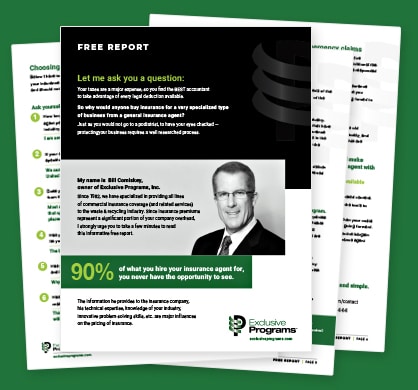When disaster strikes, sanitation companies in Florida are susceptible to various unique challenges. Natural disasters, especially hurricanes, flooding, and tornados, can wreak havoc on waste management operations, posing significant risks to both employees and the environment. Disaster preparedness for waste management is a crucial aspect of running a responsible and sustainable sanitation company. In this blog post, we’ll delve into the world of sanitation company disaster insurance and explore strategies for disaster preparedness in the waste management industry.
Disaster Preparedness for Waste Management: A Critical Necessity

Key Elements of Disaster Preparedness for Waste Management
Risk Assessment:
Conduct a thorough risk assessment to identify vulnerabilities in your waste management system. Consider factors like the location of your facilities, proximity to flood zones, and the structural integrity of your equipment.
Emergency Response Plan:
Develop a comprehensive emergency response plan that includes protocols for evacuation, securing hazardous waste, and communication strategies. Train your staff to ensure they know how to react when a disaster is imminent.
Insurance Coverage:
Sanitation company disaster insurance is a vital part of your disaster preparedness strategy. It acts as a financial safety net, providing the necessary resources to recover and rebuild after a disaster.
Equipment and Infrastructure Resilience:
Invest in infrastructure that can withstand extreme weather conditions. Additionally, have backup equipment in place to ensure minimal downtime in case of damage.
Environmental Protection:
Implement measures to protect the environment, such as containment systems for hazardous waste and proper disposal procedures.
Sanitation Company Disaster Insurance: Your Shield in the Storm
One of the pillars of disaster preparedness for waste management is having the right insurance coverage. In Florida, where hurricanes are a recurring threat, sanitation companies need robust insurance solutions to mitigate risks. Exclusive Programs, Inc. offers specialized sanitation company disaster insurance, including their WasteGuard program.
Property Insurance:
Property Insurance under the WasteGuard program plays a critical role in protecting the physical assets of your waste management business. This includes your facilities, equipment, and vehicles. Here’s how it can benefit your operations:
- Facility Protection: Waste management facilities often require specialized infrastructure. Property insurance ensures that your processing plants, transfer stations, and other critical facilities are covered in the event of damage caused by natural disasters such as hurricanes. This coverage can help with the cost of repairs or even rebuilding if necessary.
- Equipment Safeguarding: Your waste management equipment is a substantial investment. Property insurance ensures that your machinery, vehicles, and specialized equipment are protected. In the aftermath of a natural disaster, the cost of repairing or replacing these assets can be substantial. Property insurance provides financial support for these necessary repairs and replacements.
Liability Coverage:
Liability Coverage is an essential component of the WasteGuard program as it addresses potential legal and financial liabilities faced by waste management companies. Here’s how it works to safeguard your business:
- Accident Protection: Accidents can happen in any industry, including waste management. Liability coverage ensures that your company is protected from potential legal claims and associated expenses in the event of accidents on your premises or involving your employees.
- Environmental Incidents: Waste management is highly regulated due to the potential environmental impact of improper waste handling. Liability coverage protects your company from claims related to environmental incidents, such as spills or improper disposal. It covers the legal and cleanup costs, helping you maintain compliance and environmental responsibility.
Business Interruption Insurance:
Business Interruption Insurance is a vital component of disaster preparedness for waste management. It ensures that your company can continue to operate and generate income even in the aftermath of a disaster. Here’s why it’s crucial:
- Continuity of Operations: Natural disasters like hurricanes can disrupt operations and lead to significant downtime. Business Interruption Insurance provides financial support to cover ongoing expenses, employee salaries, and lost income during the period when your business is not fully operational. This allows you to maintain business continuity, protect your workforce, and minimize financial losses.
Pollution Liability Coverage:
Pollution Liability Coverage is another key aspect of the WasteGuard program, specifically designed to address the unique environmental risks associated with waste management. Here’s how it can benefit your company:
- Environmental Cleanup: In the waste management industry, there’s a potential for hazardous waste incidents that can have severe environmental consequences. Pollution Liability Coverage helps cover the costs associated with environmental cleanup, ensuring that your company can respond promptly and effectively to minimize environmental damage.
- Liability Claims: In the event of environmental incidents, you may face liability claims from regulatory bodies or affected parties. Pollution Liability Coverage provides protection against these legal claims and helps with the associated legal expenses.
Exclusive Programs, Inc. understands the unique needs of waste management companies and offers insurance solutions designed to minimize financial losses and expedite recovery efforts.
Exclusive Programs: Tailoring Solutions to Your Needs:
Sanitation company disaster insurance is not just a formality but a lifeline that ensures the continuity of your operations and the safety of your employees during hurricanes and natural disasters. Disaster preparedness for waste management, including robust insurance coverage like the WasteGuard program, is a critical step in safeguarding your business in the face of adversity.
Don’t leave your waste management business vulnerable to the unpredictable forces of nature. Prepare for the worst and secure your company’s future. Explore Exclusive Programs WasteGuard insurance program today and take the first step towards comprehensive disaster preparedness.
In the face of a hurricane, you can’t control the weather, but you can control your level of preparedness. Contact us for more information and take charge of your sanitation company’s future.



